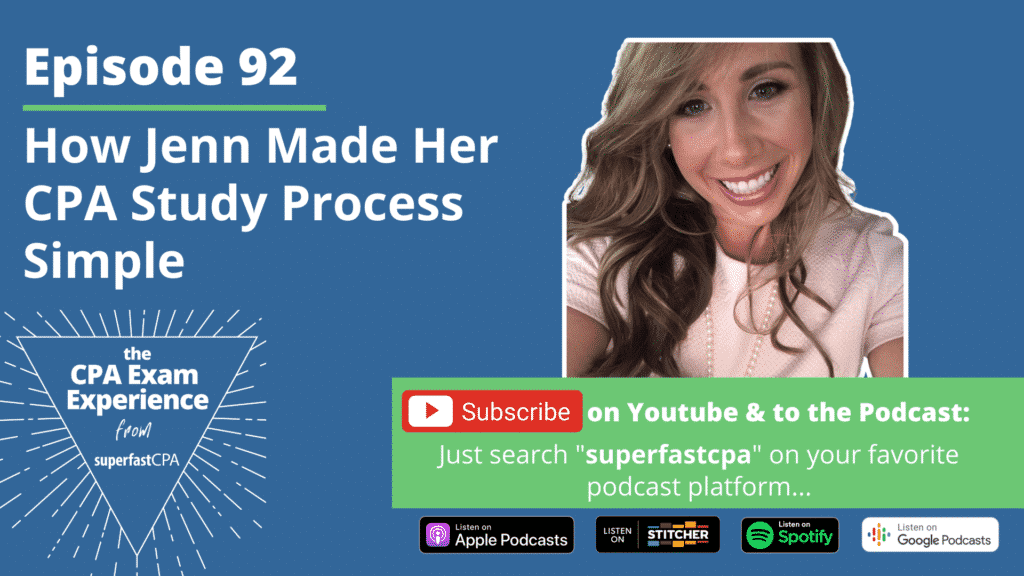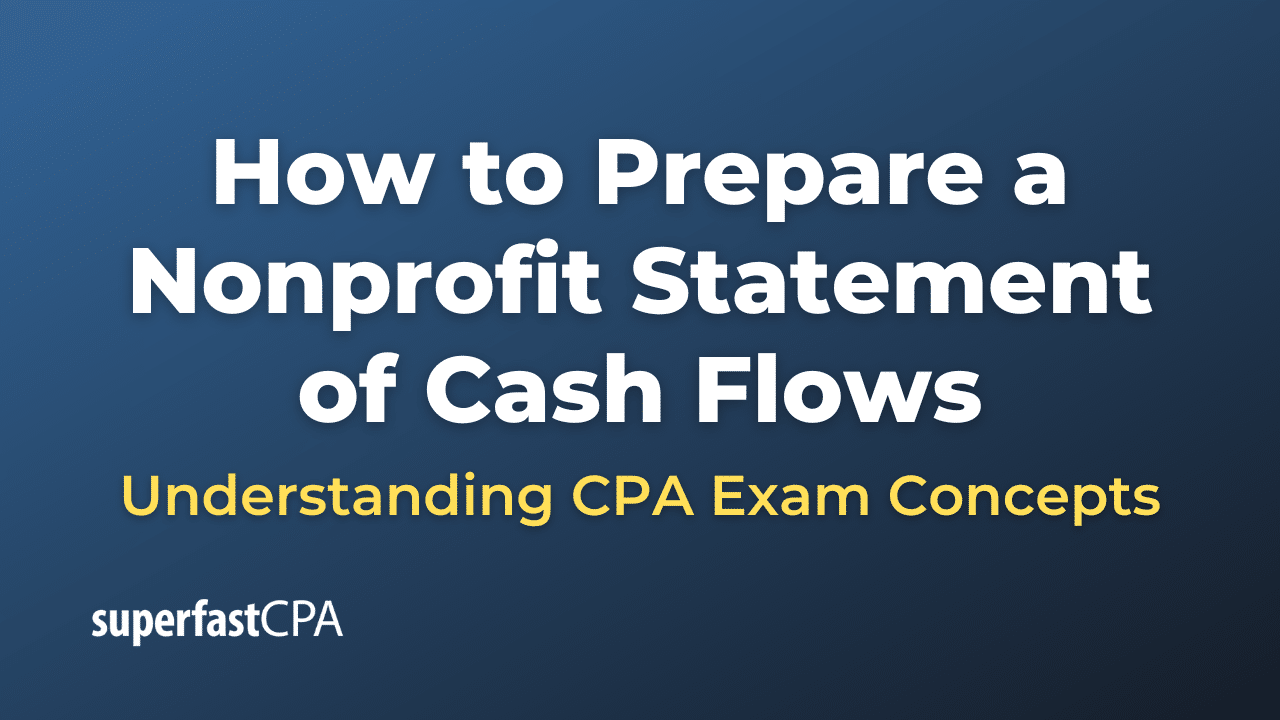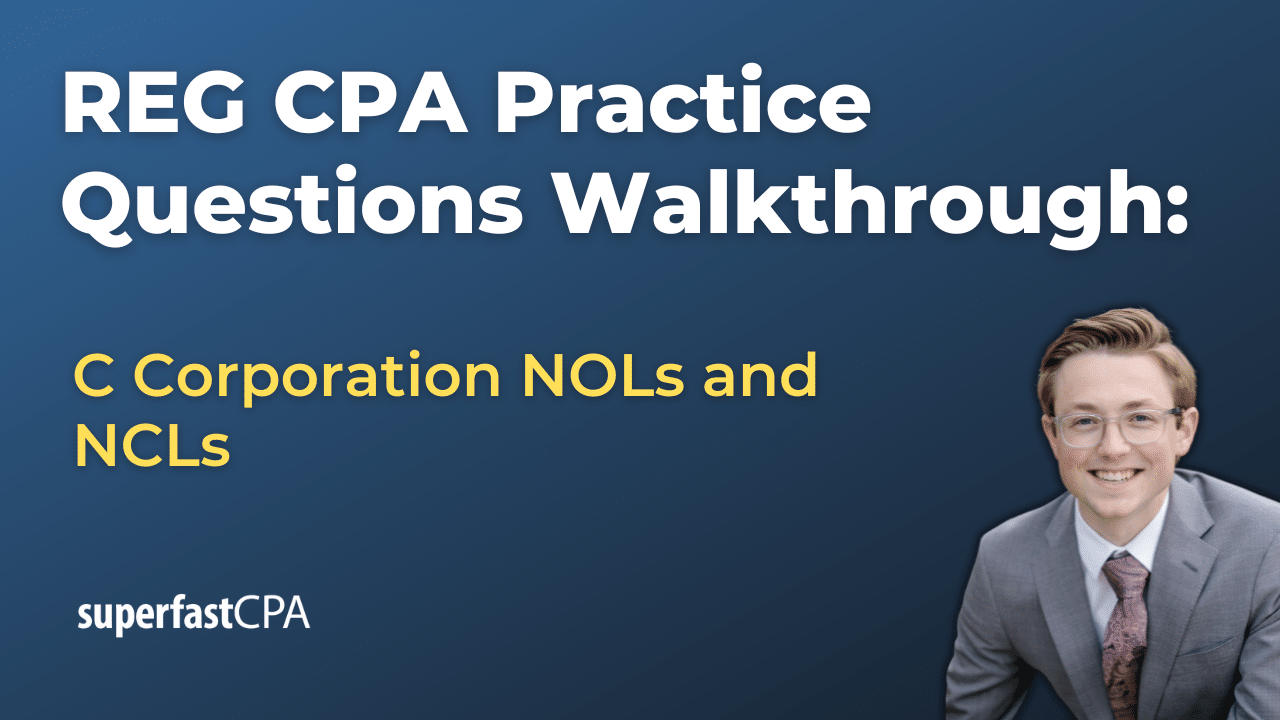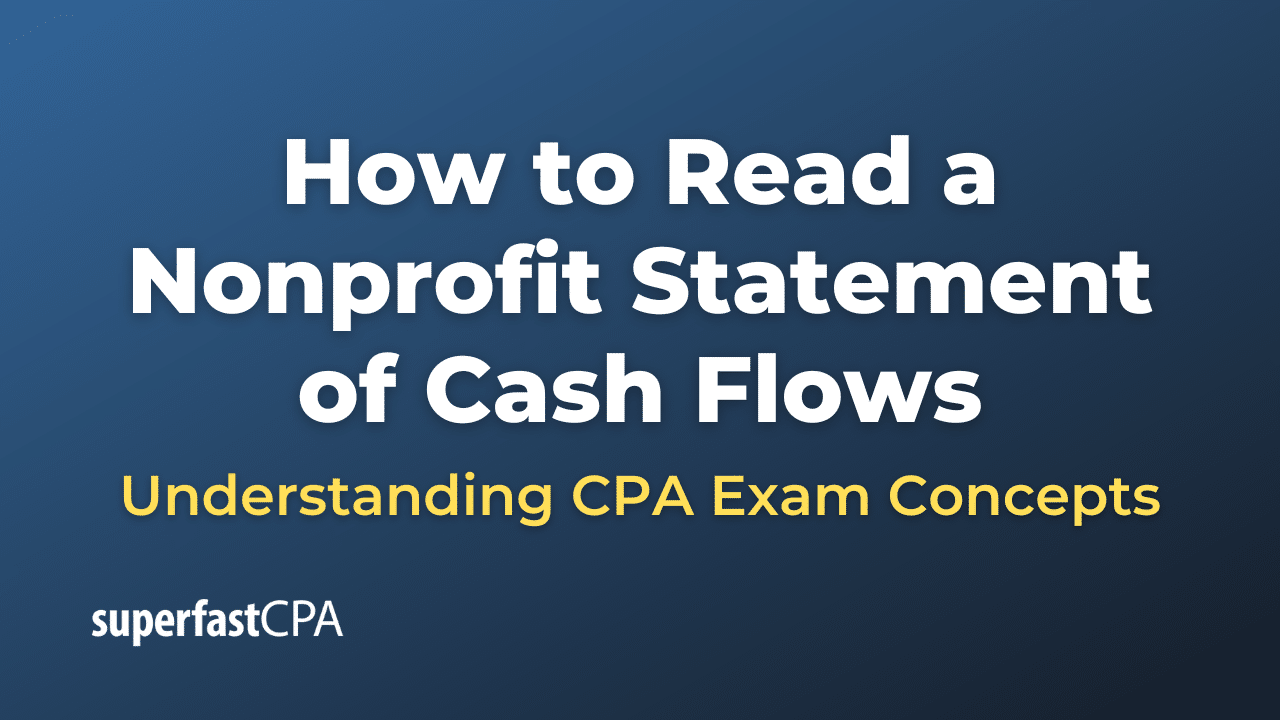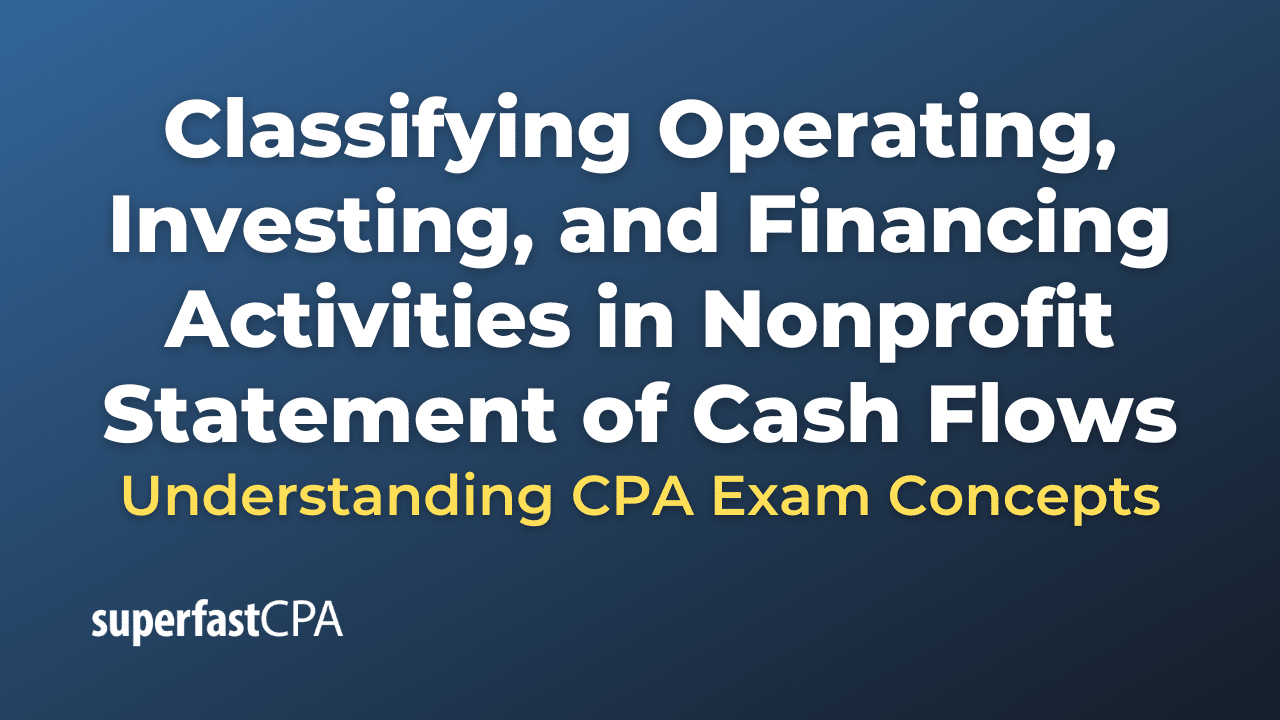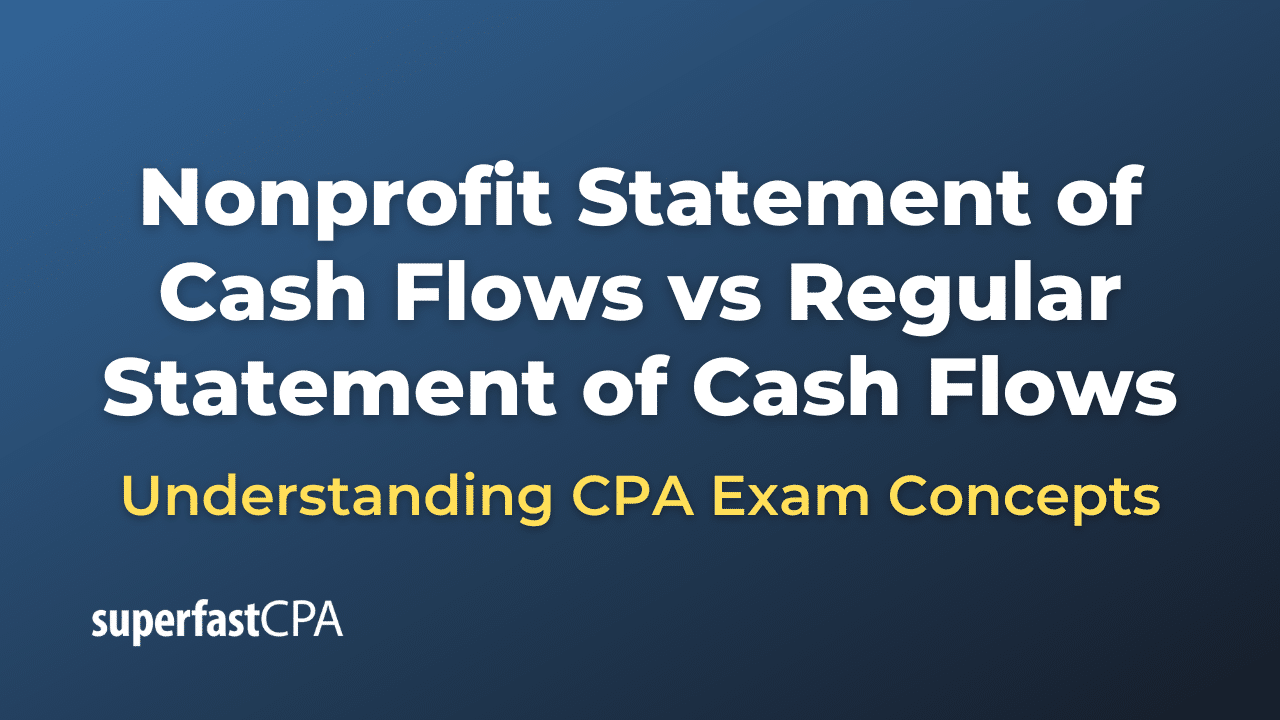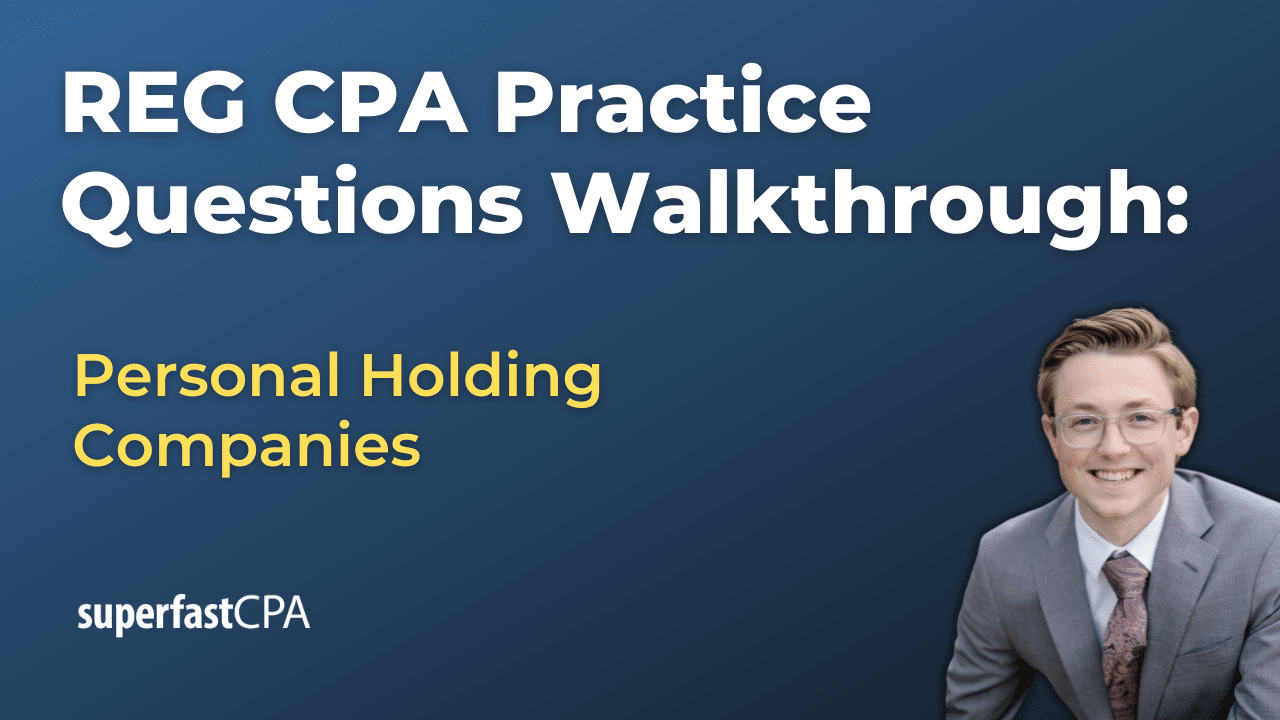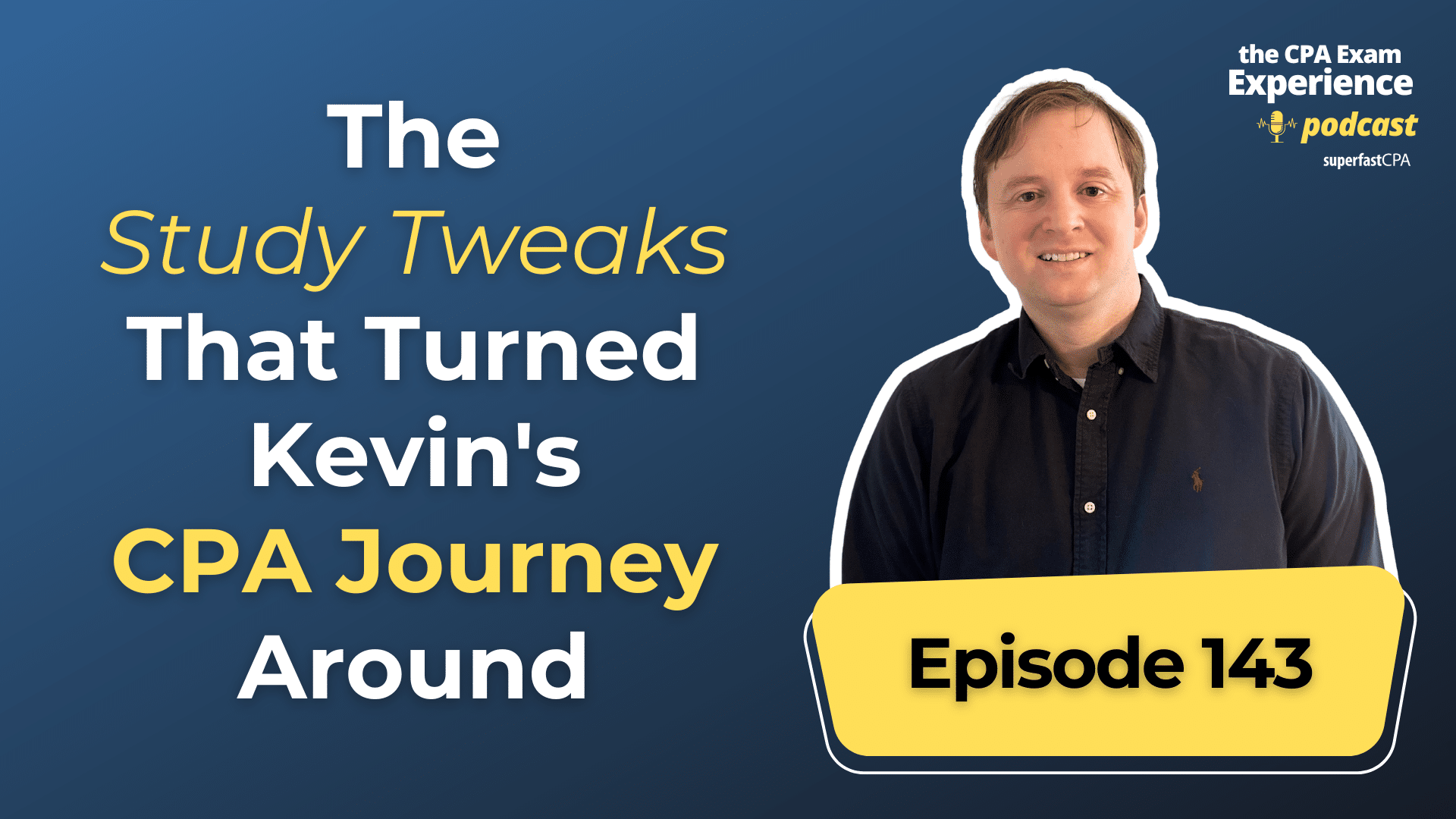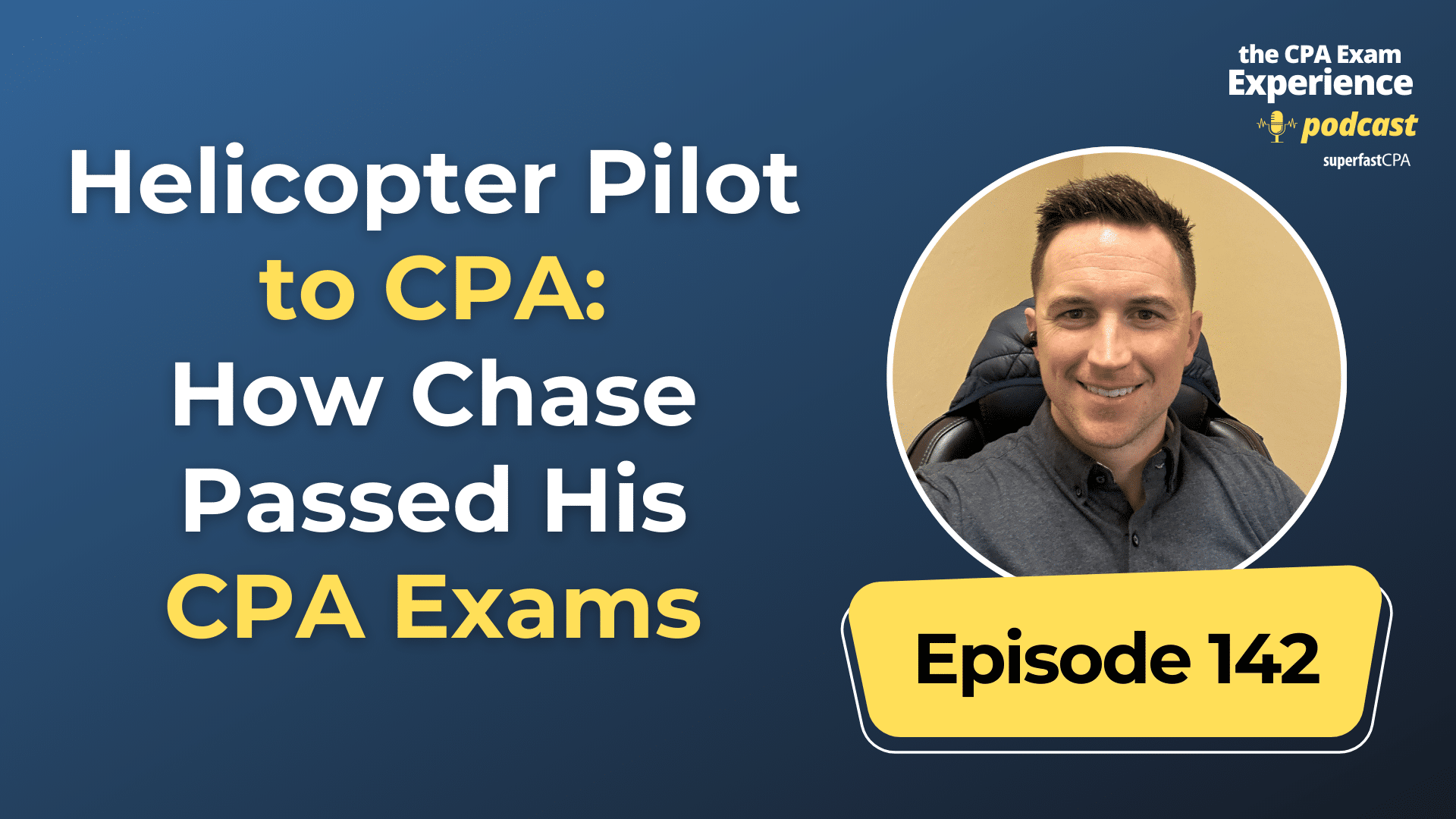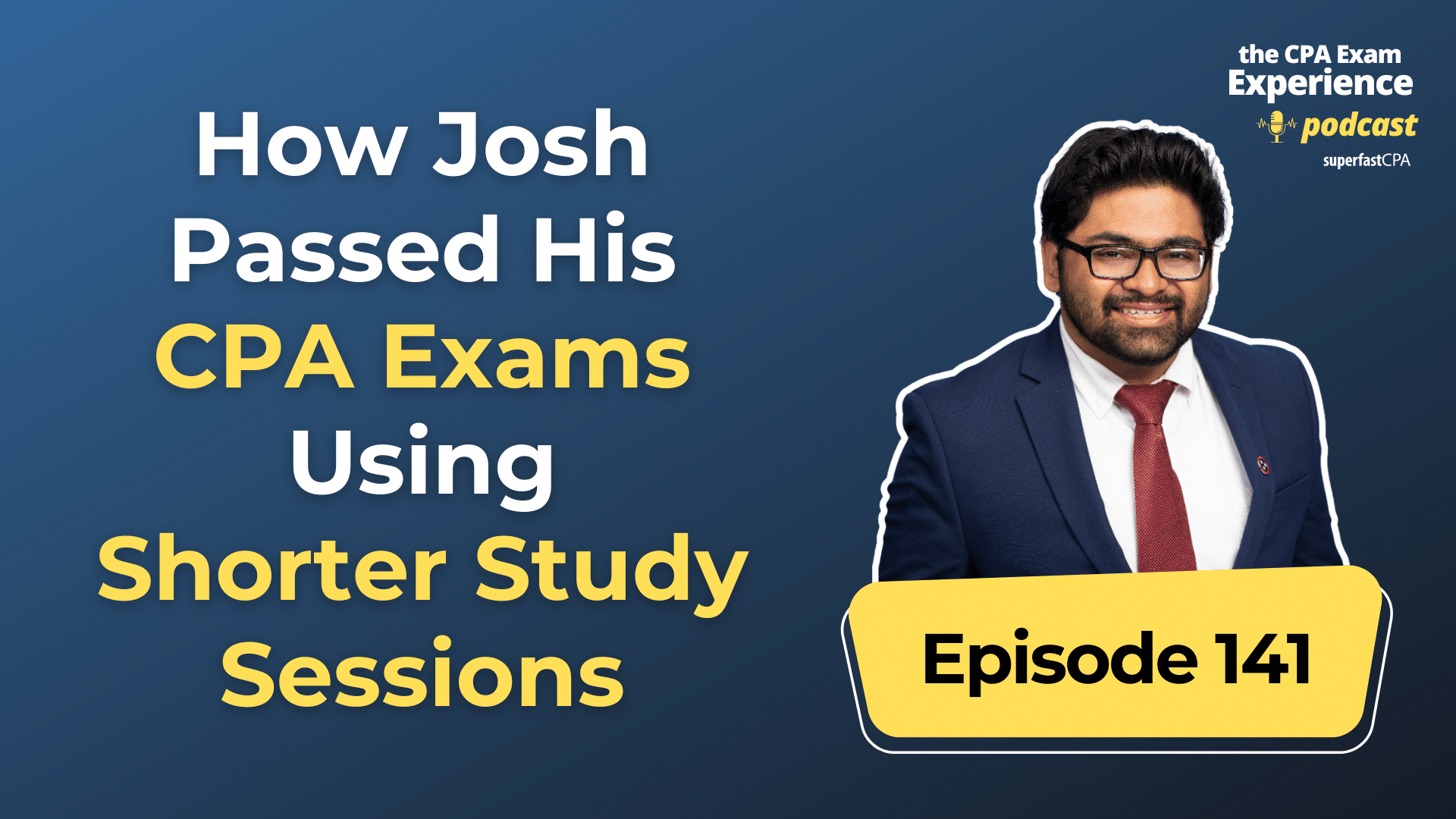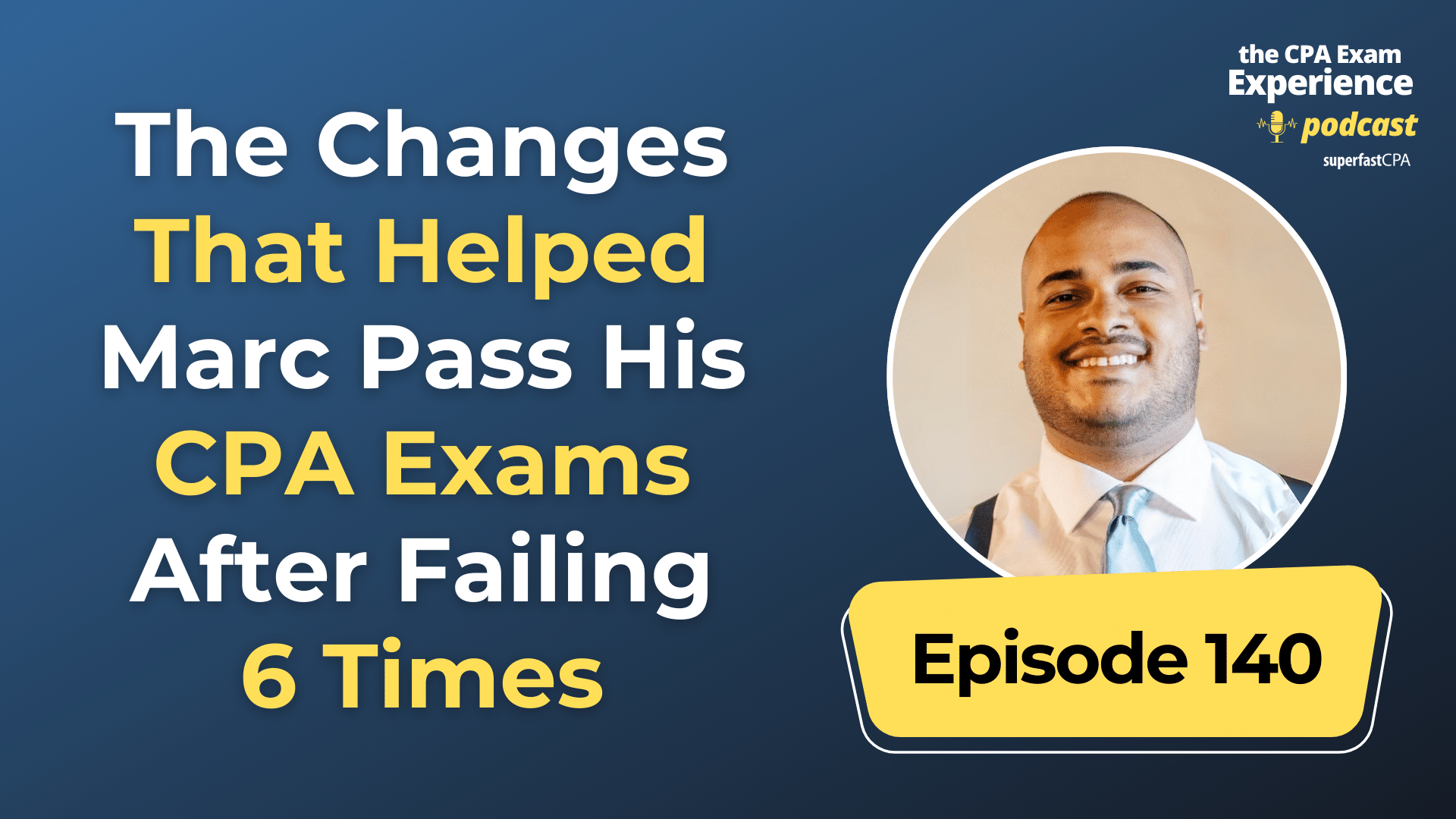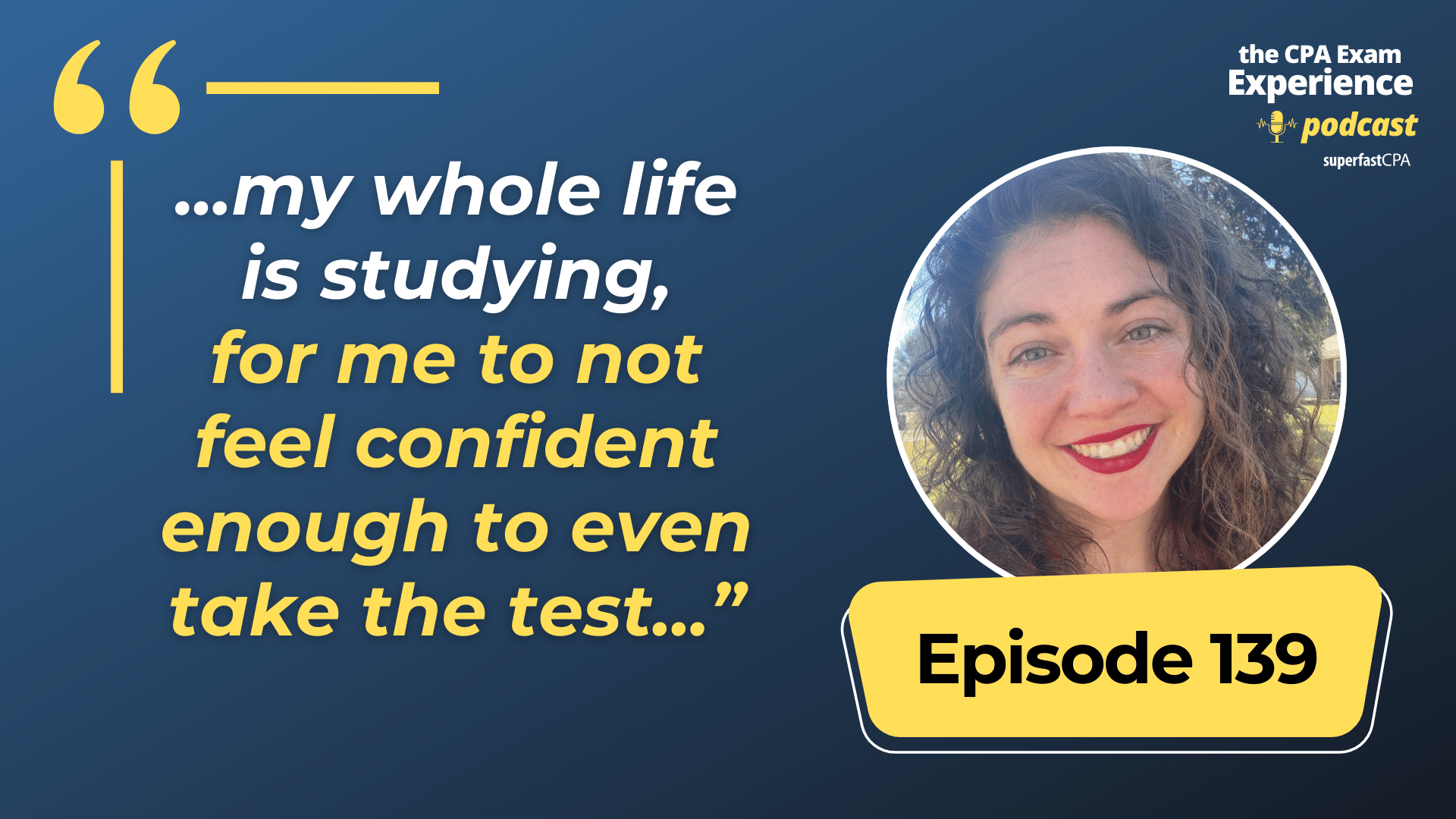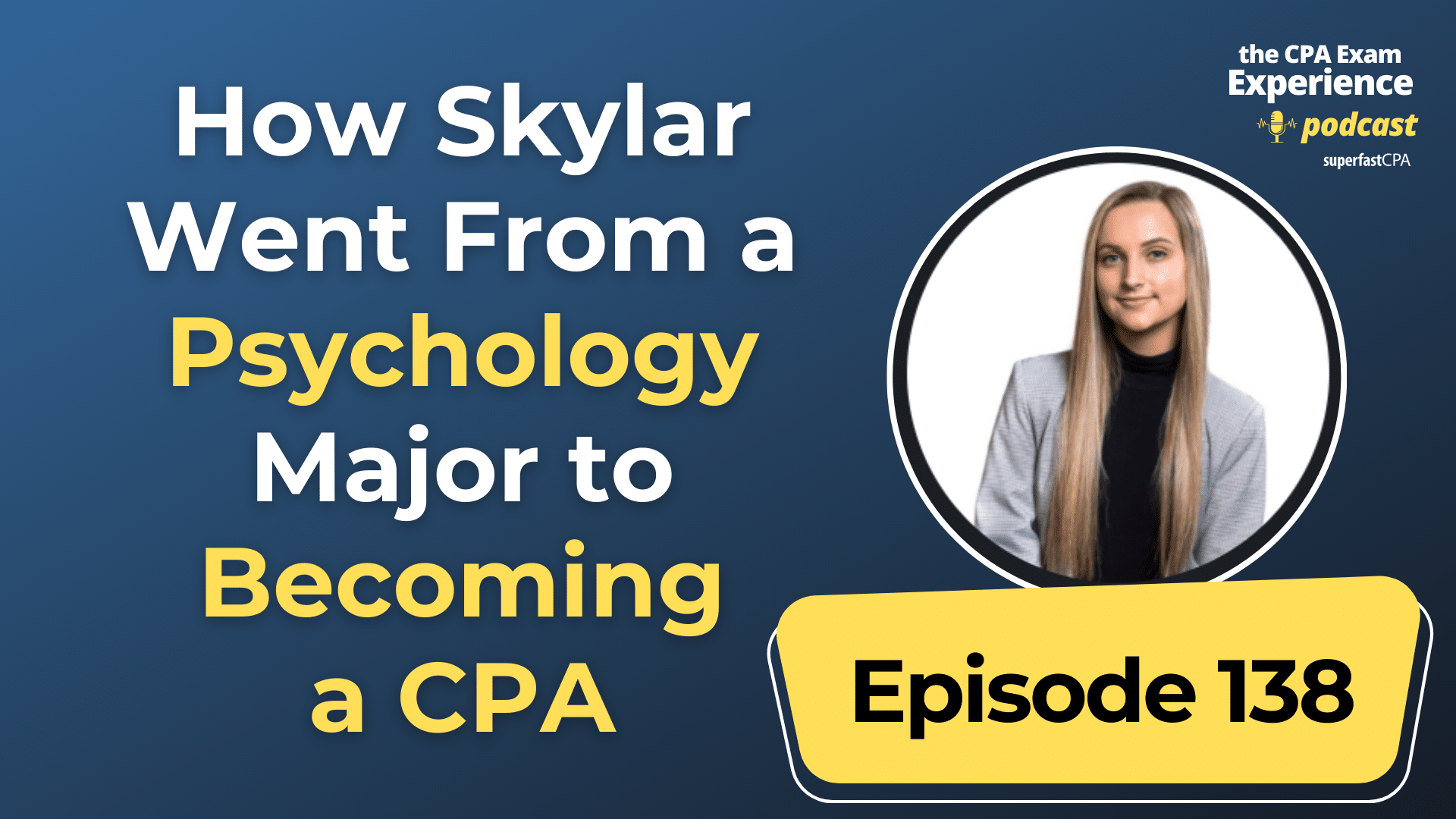In this SuperfastCPA reviews episode, you’ll hear how Jenn simplified her CPA study process and went 3/3 on her remaining exams using SuperfastCPA.
Click here to open this episode directly in Apple podcasts…
Table of Contents
Important Links
- Learn our “ultra-efficient” CPA study methods here…
- Enter the free podcast giveaway…
- See CPA score release dates here…
- How to study for the CPA exams…
Episode Timestamps
- 00:00 Jenn McKenn Interview
- 03:22 Jenn’s CPA Journey
- 05:00 Her Study Breakthrough
- 08:02 2 Hours Study Routine in the Morning, a Weekend Off
- 10:39 How Going Through the Test Bank Helps Studying Section by Section
- 13:33 “Not everything’s always going to click…”
- 15:22 Writing Notes Helps in Retention
- 17:06 “I felt like I was really well-prepared…”
- 18:20 Being Time Conscious in Taking Tests and Figuring Out on Her Own
- 20:26 Tips or Tricks that Helped Her Through the Study Process
- 22:20 “I wrote it down, finish all of them, went back, you know, to the ones that I wasn’t a hundred percent sure about…”
- 24:27 Taking the Weekends Off to Mentally Reset
- 26:15 Getting it Done and How She Celebrates
- 27:27 Her Tips for People Currently Studying
SuperfastCPA Reviews: Jenn’s Story
Jenn: I was like doing the mornings but it wasn’t consistent and I didn’t really have a structured plan, I was just like, okay, I’m reading the material and like doing some questions. And that’s why I was like, if I was, if I pass, it’s like a blessing. But after that I was like, I can’t continue, you know, to study like this, cause it just like I had no direction and I was just kind of fumbling around with it. So when I took a step back, I like watched your study hack video and that’s when I was like, okay, I have a game plan now of, you know, how you’re going to attack it going forward, and then I, yeah, got through the rest. No fails.
Nate: Welcome to episode 92 of the CPA exam experience podcast from SuperfastCPA. I’m Nate and in today’s interview, you’re going to hear me talk with Jenn. What I really like about Jenn’s story is she was very overwhelmed with the study process, she flipped through the textbook a few times and just had the realization of if I’m going to really try to learn every single word in this book and watch, you know, these hundreds of hours of video lectures, this is going to take forever.
So she came across our free training, one of our YouTube ads, watched the free training and she thought to herself, I will give this a two-week trial to see if this actually helps me learn faster, move through material faster. You know, if it dramatically improves my study process like it claims that it will.
So she starts applying the strategies and the results are what you will hear in this interview. So she has a ton of good info to share, strategy tips, insights, things that weren’t working before she started using our strategies, little things that she tweaked, mindset tips. We cover a lot of information in this interview.
Before we get into the interview, I just want to mention two things. First of course, our free study training webinars. Again, with Jenn’s story, this is where she started.
If you’ve not taken the time yet to watch one of these free one hour trainings, the things that you will learn in this training will save you months and months of time of frustration and likely hundreds of dollars from having to retake sections.
Pretty much every person that you’ve heard on this podcast previously started by watching one of these same free trainings. So to sign up for one of the trainings, go to superfastcpa.com. It’s the main thing at the top of the homepage or the link to one of those trainings will be in the description of the podcast episode, or if you’re watching this on YouTube.
The second thing is our free podcast giveaway. So each month we give away three pairs of Powerbeat Pro headphones to three random people who entered the giveaway, whether they are customers or are not yet customers that just listen to the podcast.
So no matter who you are, you have three chances each month to win a pair of the headphones. You only have to enter once and then you are permanently in the drawing pool for the headphones month after month.
You can enter the giveaway at superfastcpa.com/enter or again, the link to the giveaway will be down in the description of the podcast episode or in the YouTube video.
So with that being said, let’s get into the interview with Jenn. let’s see, when did you get your fourth passing score? How long have you been done?
April 9th. So just-
Nate: Oh, just barely?
Jenn: Yeah, just barely. So I submitted everything for license yesterday, so I’m like fingers crossed.
Nate: Yeah, congrats. That’s awesome.
Jenn: I’m very happy it’s over with.
Jenn’s CPA Journey
Nate: Yeah, uh, and then when did you start?
Jenn: So I started, in February of last year. So, it was actually kind of like, the pandemic for me like it was like, sort of like good because I feel like I- I’m very social and like doing things. So it kind of caused me to slow down a little bit. So I had taken one. Oh, I had like REG set up. and I was like, oh, I thought I could wedding plan and do that. So I had to take it on the last day and I’m like, if I pass, I’m going to like really start studying.
And I passed. So I was like, this is my sign.
Nate: Yeah. That’s awesome. Wedding plan for yourself? Did you just get married?
Jenn: Yeah, I got married in October 19 so I was planning on doing, starting studying because my job was slower at that point, but then the wedding planning took over. So I’m like, you know, kept pushing it off but then I’m like, oh, I don’t want to lose the $300, you know, so go with it and then hope for the best.
And then-
so what, what section was that? The first one.
Jenn: Uh, REG.
Nate: Nice.
Jenn: So I had taken it like two times prior, like a few years ago but like I never really put any effort into it. So I’m not like surprised I, you know, I didn’t pass. So this time was like, even it was a month that I’ve really studied and applied myself.
So I was like, okay, I know if I just put my mind to it, you know, I can do it. I was happy cause like I finally had all the tools, cause like I had started public accounting back in 2014 and you know, at first I was all gung ho, I bought Wiley and everything. And then a few years later I bought some of the SuperfastCPA stuff.
Then once I passed this again, I was like, okay, let’s all use all the tools together. Get it done.
Her Study Breakthrough
Nate: Well, yeah. Let’s yeah, let’s kind of start there. So in the, you know, the little thing you filled out you said, uh, your study hacks were invaluable. So at what point did you kind of watch those videos and just to get the strategy side down?
Right after I passed REG because like FAR I for me, it was like, oh my God, seeing the book 1200 pages, I’m like I need to change my approach to master the material because I was just like so overwhelmed. So like for me learning, like at first, like it was really discouraging using like the method of taking the questions before you read it, cause I hate being like wrong, wrong, wrong but like after I’m like, okay, like I’m a reasonable person. Let me do this for two weeks, and if my scores aren’t improving or if I feel like I’m not retaining, I can go back to my old ways. That was really great because like it really honed in on what I needed to look for when I was reading the material.
Jenn: And then unfortunately, like I think the way I learn best is reading the material and writing notes. So like every day, I would like you suggested your two hour blocks, I would read and take notes for an hour and a half. The last half hour, I’d do questions. And I think the point you made also about doing a cumulative review for FAR with the best thing I could’ve done because I still remembered what I did on day one when I was reviewing.
And then for me, your notes are so on point. The last two weeks, like I’d be done. And I read every single page of every book but the last two weeks, all I would do is read and rewrite your notes and do questions and it just, it became a really efficient way of studying. And then like I did for, by the end when BEC and Audit, I wasn’t as good about it but for a while I did like also delete my social media apps and just do your little quizlets and like that was a really good point too because like that really made me cognizant of how many times I’m actually checking my phone during the day, like an hour like waiting for someone to send you something like, okay, I could do five more questions.
And then it’s like, how many of your, a lot of your questions were on the exam so I just feel like the way you’ve narrowed down like the highlights, you know, it’s just it’s so much more valuable than like the actual like Wiley or, you know.
Nate: Yeah. Well, I appreciate that.
Uh, yeah, we’ve gone through like, all of our stuff is based on past exam questions. So, you know, instead of trying to make summaries of like everything, I mean, that’s already what other review course does. So like our notes are based on exam questions. So when we put stuff in for a topic it’s based on that idea of like, if you go through the questions for the lesson, you realize you’ll, you’re seeing really only questions from like the same three or four key things from the lesson instead of like everything. anyways, so yeah, our review notes are based that way, and then the audio notes are based on the review notes, and then of course our quizzes are just questions, so… So going back.
2 Hours Study Routine in the Morning, a Weekend Off
Nate: So would you do two hours in the morning then? You’d try to do that two hour session?
Jenn: Two hours and then I’m not gonna say it was perfect but like once a month, I know it really looking at my calendar, I really did take a week, a weekend off just to mentally reset because like I realized you know, in the mornings it’s you always say you came clear,
there’s no distractions, like they’re two like genuine hours. But I don’t know with anything I feel like there’s a point where you’re like, I can’t take this anymore. So like, I feel like it was important for me to recognize when I’m just wasting my time for two to, you know, the weekend thing that two hour sessions, I’m like, well, I should just be doing something I want to do rather than beating myself up for, you know, not studying.. But like even I applied that on the weekends, which is great because then I felt, I know I had my little Corona circle.
I still did everything I wanted to do every weekend and I was done by 10:00 AM. And because it was like really felt like it didn’t like I always had this like thought, like studying was going to take my life. Like I was going to study, you know, all weekend. I’m not a night person. So after work I’m spent, so I’m not going to stop and that just, you know, being dedicated in the morning and just having that feeling like, oh, I’m done.
Like I did it. It’s great. Like now I can go to happy hour. That was a game changer. And like, it’s funny cause one of my coworkers now like he just passed BE- BEC so I like, he bought up cause I’m like, you gotta get it… so he bought everything. So I’m hoping, but he’s just really stubborn, oh, I’m going to make it work after work.
He’s not doing it now, and he’s just getting up in the morning I’m like, I hated it. But now honestly, like even after it’s only been a month but you know, I’ve been, I’m hoping to start like a small business on the side for my current job just because I don’t want to be in corporate for forever. So I’m like now I do I get up and do that every morning. So I feel like it’s just it’s almost you know, you preaching that the early bird gets the worm like you really do.
Nate: Yeah. And you can, right. Several people have mentioned that about how they made that a habit. And then now that they’re done, they’re like I should accomplish something else and keep getting up two hours earlier, you know, and it does it’s, uh, it just whatever you’re trying to work on, it just solves a lot of problems to do two very effective hours of whatever it is.
I mean yeah, for our purposes the CPA study. But yeah, even after, you know, it’s-
Jenn: Do the hardest thing in the day and you’re done and you already done like, okay, cool. I did a lot. I feel good. Yeah, so…
How Going Through the Test Bank Helps Studying Section by Section
Nate: So in your two hours, so you said you kind of, your process turned into where you would read the textbook first and then do the questions after reading it?
Jenn: Yeah. And then I was still always doing you know, how it the book breaks it into five chunks. so I constantly did get the questions I didn’t know, like I would do it for the whole, you know, the whole module rather than like current lesson I’m on.
I never actually did section by section. I just went to the test bank and then went to this section, you know, I was studying for and then just kept doing it. And then if say if I was struggling with a particular subsection, I would, you know, drill into that section. But like your other tip about the videos being a waste of time, thank God because like, when I first started or not this time around but like, when I was like eager staff oh, I’m going to pass this. The videos like that I’m looking back I’m like, oh my God, like I didn’t retain anything. I was like, checking my phone or you know, it just sometimes I feel like you just need someone to give you like the outline, the plan, like the right direction to go.
Jenn: Cause like this overwhelming to like, um, look at the book and all the study material and be like, oh shoot, like where do I start? what’s the best way to approach.
Nate: Yeah. It’s yeah, it is. It’s just massive. And yes, the- the videos it’s like that from the point of view of the review course, you know, they’re trying to put everything in there that could possibly be asked on a per lesson basis but it’s really this 80/20 thing. It’s like 20% of the material is really what you’re going to is 80% of what you’re going to see on test day.
And, uh, but most people, they just operate under the assumption that I need to watch every video, basically try to memorize it, and then read the text and then do the questions. But then, yeah, like you said, people end up just, uh, it’s easy to like tell yourself you’re studying, to press play on a video and then just kind of sit there.
And like you said, most people end up just not really watching or even if you watch it, it doesn’t directly translate into answering questions on those topics, you still have to struggle through the questions, uh, learning the context of the questions and like recognizing patterns. That’s why those daily sets of 30, again, just solve so many problems.
You just get very, uh, familiar with answering test questions. And you were doing that as well, right? That this you’d end with a set of 30, like a review testlet kind of?
Jenn: Probably do more, more than that because I would just do the cumulative for what I covered so far. And then again, like the whole module that I was currently working on and then I kept, you know, adding more each time.
Yeah. which is really…
“Not everything’s always going to click…”
Nate: So what was your process of, like if you came to a topic that you really struggled to understand or, uh, when you do the review questions, you kept missing questions. What was your process for, did you take notes on those types of things or create flashcards? What’d you do for that?
Jenn: So, like I think what I, I always gave myself like two weeks to like completely review.
So, you know, by then I know you’re already know my like topics that, you know, still aren’t really hitting home. So at that point, like I kept that accountingtools.com was really good for me because it really broke it down. And I found if I had I kept going back to the questions for that one specific subject section.
And then my dad, like he was telling me since I was a little kid, just always memorize the right answers. So I’m like, okay. Even if I don’t understand this concept fully, if I know the right answers, it’s gonna get me there.
Nate: Yeah. See, I, I am an advocate of that. Uh, and that was one thing, you’ll hear that advice but on the opposite side, you’ll hear people say, “Don’t just do questions to the point where you’re just memorizing specific questions”. And I kind of disagree with that. It’s if you’re that familiar with all the test questions that you have basically memorized, like you obviously want to understand why, but it does go a long ways to know,
okay, this is a very similar question to the one that I’ve seen a million times and memorized, and so from there you can identify, you know, the difference. So like, yeah. I, I agree with that.
Jenn: Especially cause in those circumstances, it’s only usually like the things that you don’t understand for everything else it’s like you understand but then at some point not everything’s always going to click so you have to, you know, at some point be like, okay, what’s going to, you know, kind of-
Writing Notes Helps in Retention
Nate: Exactly. Uh, what was your- sorry. I know you just answered this. So did you, uh, did you, did you say you did notes or wrote out flashcards?
Jenn: So I wrote out, like I have like notebooks and notebooks of notes.
Nate: Okay. Taking notes. Oh, and you said you rewrote our notes even in the last two weeks?
Jenn: Yeah, because that for me, I don’t know why the writing and then after I rewrote your notes, for me like instead of flashcards, I don’t know why but I think it just because it goes back to high school where, you know, some classes would let you have the cheat sheet and you’d type in font six and, you know, to memorize.
So then like for me, I could remember, okay, I put this formula on this part of the page. So then after I rewrote your notes again but like now it’s just you know, the key points or the subjects I’m struggling with. So then I had my cheat sheet you know, ready to go and I could be like, oh, I remember where it was on that sheet.
Nate: Yeah. Yeah. And that’s something that I’ve always kind of preached flashcards but doing these interviews, it just made me realize there’s like these key, uh, key ingredients to the study process. There’s four or five things that like you have to be doing, and some form of writing stuff out in your own words is one of those.
It’s that’s just like crucial, especially for obviously the stuff that whatever it is you just personally struggle to understand or remember. And a lot of people mentioned they, they were just a note taker. They didn’t really like flashcards so they would do it differently. And it’s one of those things you can like do that aspect or that, uh, element of the study process in whatever way works best for you. But yeah, you have to some form of that… writing stuff in your own words.
“I felt like I was really well-prepared…”
Nate: And you said you, you left two weeks till you you’d get through all the material and just you’d leave two weeks to review?
Jenn: Review and figure out anything just because like I hated like, I love the feeling of okay, I read the whole book. I have a solid foundation. Now it’s like let’s, you know, go back to things I don’t understand. Let’s really, you know, because especially like for me, like FAR was just so daunting. Cause I’m like, I failed, how do I go back and even start to studying for this again? Start studying, you know, and it’s it was super funny for me
cause like for whatever reason, like the leases like are terrible. I don’t understand them at all. Now, luckily we got a whole lease module at work. So now I’m finally starting to comprehend it a bit, but, yeah, the two weeks I would go back, I’d start writing your notes for cause they because I wrote them verbatim for the first week.
So it would take me a few days every time, you know, to go through your whole book. And then meanwhile, I do two hours of that, two hours of questions. And then like just like, I liked it because I still stayed on that schedule of two hours reading, and four hours, you know, on the weekend and I didn’t feel like I had a cram or I was ever panicking.
I felt like I was really well-prepared.
Being Time Conscious in Taking Tests and Figuring Out on Her Own
Nate: Yeah. so for those two weeks you would, rewrite the notes, just do like sets of 30 questions over and over. Uh, how did you use practice SIMS in your study routine?
Jenn: I never did cause I figured I did cause I would at least finish 80% of all the test bank questions. So that was a few, you know, few thousand. And so like I figured after FAR is like the, if you know the multiple choice, you know the- the SIMS and I just found since you had the authoritative literature, and I’d done to my practice questions, I had so much time for the SIMS. I’m like, I’m not even going to stress myself out with them because it just wasn’t worth it.
Cause I feel like for this last one or audit, I don’t know why I decided to look at some of the, you know, the task-based and I was like, oh my God, I’m so confused. And I’m like, I know this stuff like so I’m like not even going to, you know.
Nate: Yeah. That’s, uh, it is, it’s just mostly a time thing on test day. Like the biggest thing for the SIMS is if you’ve studied effectively the whole time, you know the concepts more or less. And so it is really just crushing the multiple choice quickly which doing so many questions throughout the process, you like I said, you get really good at it and quick at it. And, uh, yeah, that’s like the best thing you can do on test day for the SIMS is just have plenty of time to where you’re not stressing out about time to just sit there and read through them.
And, uh, yeah, you just basically figure out what it’s really wanting you to do. And from there, you know, you are more or less know what to do. It just takes some time to
Jenn: Yeah, I still can’t believe like we don’t have like dual screens for those yet. Cause you know, the monitors so dinky and you’re like trying to drag it up and open the Excel.
It’s just, ugh, gosh.
Nate: Right. Yeah, that that is something that and especially if they’re wanting the exam to be like the real work experience, like nobody works on one monitor. Anyways, they’ll probably never change that. Nope.
Tips or Tricks that Helped Her Through the Study Process
any other tips or tricks through your study process that you, that really helped you, you wanted to mention or anything?
Jenn: I just think for me it was really helpful like I picked my exam date and I, you know, I like, I- I basically I knew like I admire the people that could pass the exam you know, in three or four months but I’m like, I kind of acknowledged like I knew that wasn’t me from the start. So knew was just like, okay, like scheduling like scheduling the test and going back, like breaking in I know my reading pace with notes is 12 pages in the two hours. Slow but steady. So just you know, like scheduling the times and I don’t know, like just making it very methodical and just no excuses you get up and just, you know, get it done.
But I think I pretty much, like your study hacks honestly just set me up for success.
Nate: So, do you, do you work in tax?
no, thank God. I- I, used to do a little bit at tax and I was in public accounting for five years, but now I’m- I’m in finance at a construction company. So this is interesting.
Nate: Yeah. I just, I just wondered if, uh, cause you did REG first and, and just passed it without, you know.
Jenn: Oh, I did it first because I hate taxes and it doesn’t make sense to me. So I figured like FAR like I understood it. So at least like I think I personally would have had the opposite problem. Like I would have saved tax for the end and I wouldn’t be passing it. So I was like, I want it, let’s get that one.
Nate: Yeah. To start with, yeah the hardest one out of the way. And yes, I agree with that. The current thing that everyone’s asking about is, uh, like BEC and REG are going to change a bunch on July 1st.
So everyone’s like rushing to pass those two but in general. Yeah. I always would say that same thing. Start with REG or FAR. You don’t want your 18 months to start till one of the hard ones is done.
“I wrote it down, finish all of them, went back, you know, to the ones that I wasn’t a hundred percent sure about…”
Nate: Oh, so on test day, I guess there’s probably not much to say about it, but just from following this process, doing so many multiple choice, you already mentioned it, you just, you would just cruise through the multiple choice on test day and have tons of time for the SIMS?
Jenn: Yeah, because by the end, I honestly averaged out unless I would do, I average on 30 seconds per question.
And then say if I didn’t know one, I tend to second guess myself and it’s usually the wrong answer. So if I didn’t know one like right off the top, I wrote it down, finish all of them, went back, you know, to the ones that I wasn’t a hundred percent sure about. And then, you know, like again, I wanted to leave the most times I gave myself like two minutes to be like, you know, think through them and then it’s just, you know, throw it up.
There’s only so much you could do. And then the morning, like I’m a morning- well, after this, you know, morning person so I’d always take the 8:00 AM but it would be perfect because like I wouldn’t want to stress myself out on the test day. So like at that point, that cheat sheet I mentioned, I would just keep rereading it cause I’m like, okay, these are all my key points, everything.
I don’t really, you know, aren’t my strongest points. And, and I was like at this point, you know, I did what I can and if I have to retake it, I have to retake it. So I just I went in feeling, you know, confident, ready and just-
Nate: Yeah, that’s awesome. So after REG, uh, did you fail any or did you just go three for three on the last three?
Jenn: I went three for three. So that was, I was happy. I gave myself like six cause I gave myself six months for FAR cause that was like the summer, I like, you know, just did three months in three months for the last two and just plugged away a little bit each day. But-
Nate: Nice. Yeah. Yeah. And that’s, again, there’s the key things to do like you got to have your daily process nailed down but the timelines, you know, that’s all just like personal choice and uh, yeah. People ask me that how long should I schedule? And I’m like, well, I liked really short timelines for myself, but you know, that’s just something you got to know about yourself, or….
Taking the Weekends Off to Mentally Reset
Nate: So, yeah. so did you, uh, did you say you took weekends off because you had three months or more per section, or you just stuck to a short study session on weekends?
Jenn: Well, like one weekend per month, I would take a full weekend off just to, you know, I would try to plan you know, all my real like I’m not getting up early kind of nights for that weekend, you know. But then it was break like I felt you know, I had put in the work on month, I could fully enjoy that.
And then it kind of gave me like a fresh perspective on Monday, like okay. Like back to it. I don’t know that worked really well for me.
Nate: Yeah. And that’s, you know, another thing is, uh, just the personal there, there just has to be that like aspect of you know yourself best, like what and a bunch of people that I’ve talked to on these interviews, they would all take a Sundays completely off.
And again, it’s just, or, or some people would take like a full week off after taking an exam just to whatever, decompress or, how did you treat that once you took an exam? What’d you do, did you start the next day on the next section or?
Jenn: Because I just didn’t want to like, lose any momentum because I, like one of, after REG, I honestly thought I didn’t pass.
And I’m like, what? you know, so I didn’t study cause I took it to another testing window. So I only had to wait two weeks then I didn’t get up on mornings again. I was like, never again like I’m keeping, you know. What’s crazy how, like you can fall off that bandwagon real quick, a few late days sleeping in.
Yeah. So I was like, after that, you know, and then. Yeah, so, oh gosh, I’m just so happy it’s over.
Getting it Done and How She Celebrates
Nate: Yeah. now one of my last questions what’d you do to celebrate? Or just, what was it like getting your fourth passing score?
okay. I don’t know. This sounds so terrible. I’ve always wanted a Dom… A bottle of Dom Perignon.
Jenn: So I got that and we’re like, we grilled out cause things weren’t really open here. So it was like, I made some good steaks and had that bottle I wanted.
Nate: Yeah. If I’m ever just gonna, I don’t know if I get like a night home alone, that’s exactly that’s, that’s like peak yeah, just buying some expensive steak, that’s funny you said that, because that’s literally what I do.
Jenn: Yeah. I dunno. It’s I don’t know because I feel like I, I enjoy cooking so I cooked a lot during this but now I’m like, I’m not going to say I’m a five-star chef. I feel like I got pretty good.
So I’m looking at you know what I’m going to-
Nate: Yeah, that’s awesome. Do you, uh, off the topic. But do you grill or do you like pan sear steaks when you do them?
I usually pan sear because I like the butter but I’ve been trying to get that summer boss off her back on the grill, I guess it depends.
Nate: Yeah, I know exactly what you mean. They’re so good yeah, fried in butter. It’s anyways.
Okay. Well, we kind of went through everything.
Her Tips for People Currently Studying
Nate: Uh, last question I always ask is even if it’s something we already covered, what would you say are your top two or three tips for people that are currently studying?
Jenn: Wake up in the morning and get it done out of the way. Do the cumulative review questions and, finding like the method that works for you just because like you said, like even it came down to the, the core that you’re writing something but like flashcards weren’t for me, but like the whole concept of writing.
So it’s just like, got to just hone in what you know is making you memorize the things the best, because what works for someone else isn’t necessarily gonna work for you.
Nate: Yeah. Um, so I thought of my question from earlier. So when you said, uh, getting up in the morning kind of changed everything. So when you were studying for REG, were you trying to study after work or how were you doing it back then?
Jenn: I was like doing the mornings but it wasn’t consistent and I didn’t really have a structured plan. I was just like, okay, I’m reading the material and like doing some questions. And that’s why I was like, if I was, if I pass, it’s like a blessing. But after that I was like, I can’t continue, you know, to study like this.
Cause it just like I had no direction and I was just kind of fumbling around with it. So when I took a step back, I like watched your study hack video and that’s when I was like, okay, I have a game plan now of, you know, how you’re going to attack it going forward. And then I yeah got through the rest. No fails.
Nate: Yeah. And did you just, did you just feel a lot better in general? Uh, by the time you got to each test date after you know that following a certain format?
Jenn: After FAR, I was like, if I can do this, I can do anything, you know, and seemed like it proved that it worked. And then I just felt you know, I would, I just felt like everything was like coming together.
Like I felt like accomplished that at, at the end of every study session. I’m like, okay, I learned a lot. I’m retaining it and I just kept like building on it. And then I think the biggest thing was for me, it was like just building the confidence. Like I can do this. You know, like I’m doing this methodical you know, even though if I could have done it faster, great.
But I wish I could have cause you know, it wasn’t long year but like just sometimes like trusting the process and just, you know, plugging away.
Nate: Yeah, for sure. Yeah, it is. It’s just, yeah. I mean, one day at a time, no matter what you’re doing, it’s, that’s all you can do. And yeah, missing days though, kills momentum.
I think, I think momentum is possibly like just the biggest thing in this whole process. If you feel like you’re making progress each day, it’s easier to keep going. Whereas if you’re just feeling like overwhelmed and like you just wasted three hours every time you study, it’s like, it’s you’re starting from the beginning every single day. So yeah.
Jenn: Yeah. That’s a really good way to sum it up momentum cause it’s and then plus once you get that first test pass, I was like, oh my God. Like I never thought, you know, especially in the circumstance where REG, never thought I was going to pass it and came out the way, like you know, and then I was like, oh my God.
if I actually really now apply myself, like I can do this. And-
Nate: Yeah, that’s awesome. Well, I appreciate you doing this call. People find these really valuable and I love hearing these stories from our not students, customers I guess. Uh, I’m glad it was helpful for you and yeah, Congrats on being done.
That’s awesome.
Jenn: No. Thank you. Because I feel like you really changed the game for me to study. It was awesome.
Nate: Yeah. Well, I’m glad, glad to hear it.
Nate: So that was the interview with Jen. Congratulations to her for being done with her CPA. And you probably got a lot out of that interview as well. All the things she shared, all her strategies, her breakthroughs, the things that weren’t working, that she figured out how to change into something that was working for her as well as just being a motivating story to help you get back on track, get focused and move forward in your CPA study process.
So, if you found that interview helpful, take a second to share it with someone else who you know who’s also working on their CPA exams because these interviews are the most helpful free resource available anywhere for people trying to figure out their own study process.
So thanks for listening and we’ll see you on the next episode.

